To say this book is my ultimate favorite is an understatement. I first read it in my 20s and was enthralled at the mixture of philosophy, medieval history, and the detective story at the heart of The Name of the Rose. Much like the labyrinth library navigated by Brother William of Baskerville and Adso of Melk, the two main characters, the tale twists and turns upon itself and wends off into unexpected directions, dark corners and the occasional literary “red herring.” It takes a truly talented writer to make a 500+ novel about medieval monks, and didactic history of the medieval Catholic Church, into something compulsively readable.
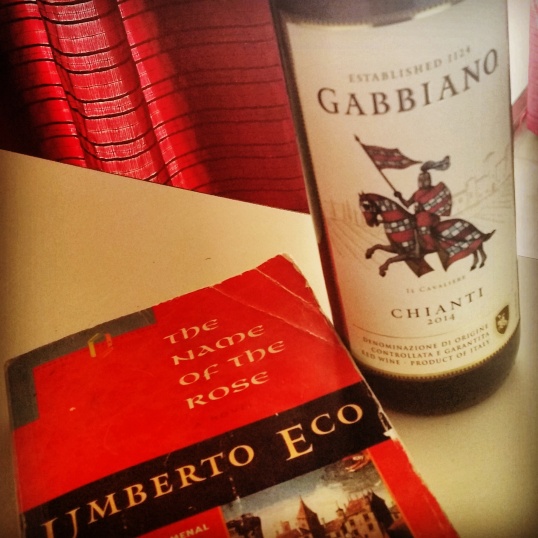
The author, Umberto Eco, died on Feb. 19, 2016, and left a huge void in the academic and literary worlds. It felt like a personal loss as well, hearing of his passing and realizing his witty prose and semiotic thought process are now gone from this world. If a writer can make a reader question her worldview and analyze things around her that she normally wouldn’t even think of, Eco has done that in my life with this book. A book about books, about libraries, about labyrinths and puzzles, about the history of the Catholic Church, and about the qualities of human nature that do not change over time. Love, desire, betrayal, greed, and that attitude of imposing your beliefs onto the world weave like fine golden strands throughout the pages of this book.

This gem of a novel was the inspiration for my (still unfinished) graduate thesis – a semiotic analysis of The Name of The Rose itself. It was, I thought, a clever turning of Eco’s philosophy back onto him, but it turns out I bit off way more than I could chew. Never take on the master unless you know you can beat him. I could never hope to come close to Eco, but I wrote 90% of the thesis as a love letter to his philosophy. It remains incomplete, but occasionally I add to it in my head. I’m no academic, but perhaps one day I will go back and write the damn thesis in honor of Eco and my love for this amazing book. Or maybe I’ll just cook in Eco’s honor, instead.
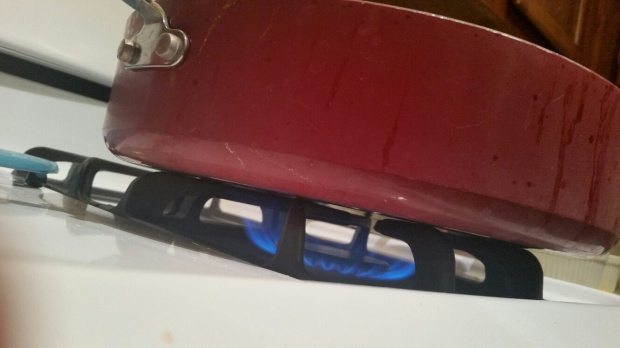
One of the more colorful characters is the monk Salvatore, a porcine-featured man who speaks a polyglot of tongues and languages, a linguistic mish-mash of Spanish, Latin, French, Italian and who knows what else. The result is a bizarrely entertaining vernacular of his own. The passage where he offers to make fried cheese for Adso and Brother William exemplifies this.
I put an end to his talk and told him that this evening my master wanted to read certain books in his cell and wished to eat up there. “I will do,” he said. “I will do cheese in batter.” “How is that made?” “Facilis. You take the cheese before it is too antiquum, without too much salis, and cut into cubes or sicut you like. And postea you put a bit of butierro or lardo to rechauffer over the embers. And in it you put two pieces of cheese, and when it becomes tenero, zucharum et cinnamon supra positurum du bis. And immediately take to table because it must be ate caldo caldo.”
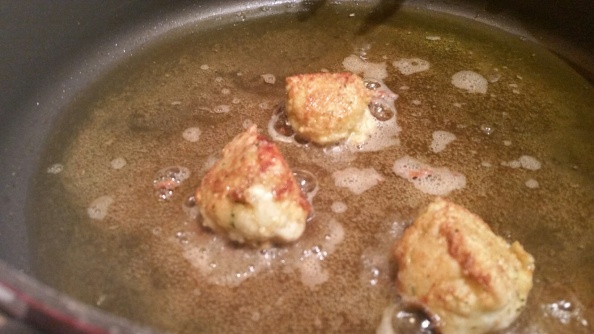
If you have any understanding of basic English and the romance languages of Spanish, Portuguese, French, Italian, Catalan or Romanian, you can completely understand what he is saying. I’ve always found the language of Salvatore a charming example of Eco’s facility with languages and symbolism.
Now, I don’t know about you, but eating melted cheese with sugar and cinnamon doesn’t exactly make my taste buds go “yippee!” So I poked around my kitchen and came up with this version, which is based on the luscious-sounding mozzarella in carozza recipe detailed by Luca Marchiori on his heavenly blog Chestnuts and Truffles.I did, obviously, omit the bread, but the idea is the same – cheese dusted in flour and fried – cheese in batter! As Luca is Italian himself, and this recipe is in honor of his fellow countryman, I thought it quite fitting to tweak it and cook it here. Grazie, Luca!

This is the method that worked for me.
Ingredients
1 egg, room temperature
2 tablespoonfuls of flour
1 tablespoon Italian breadcrumbs
1-2 teaspoons ground thyme
1-2 teaspoons garlic powder
Mozzarella cheese
Camembert cheese
Parmesan cheese
Olive oil for frying
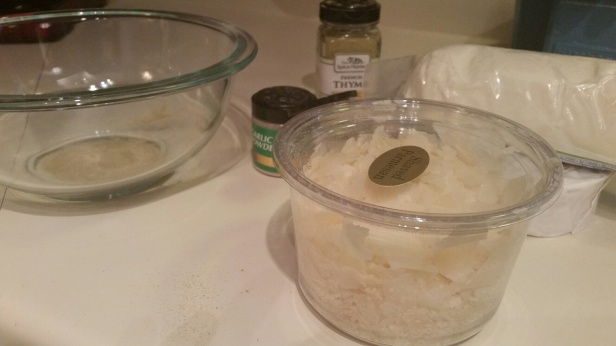
Method
Crack your egg into a ramekin. Add your flour and breadcrumbs into another ramekin. Add the thyme and garlic powder into another large bowl, then start chopping up your cheeses into small pieces.
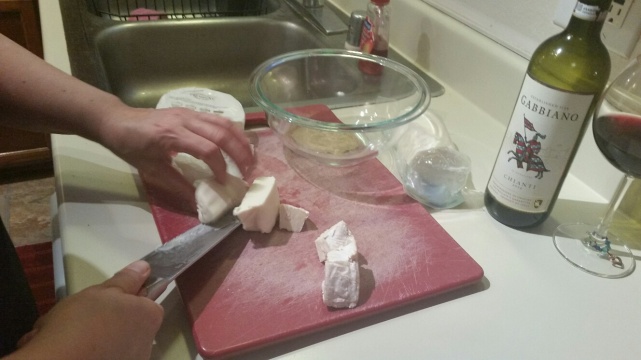
Mix the cheeses and herbs together with your hands, and roll into small balls. Yes, I said balls.
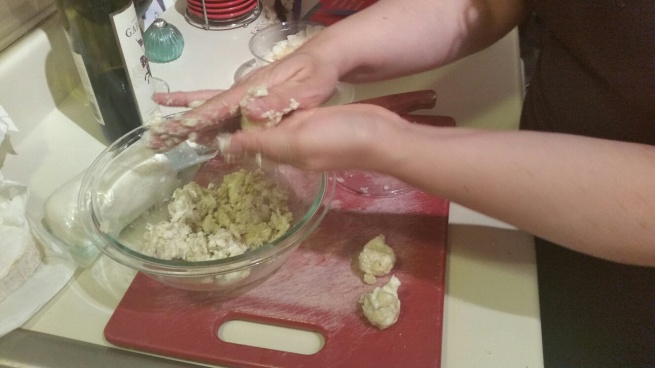
Return your happy little cheese balls to the bowl, and refrigerate for about 30-45 minutes.
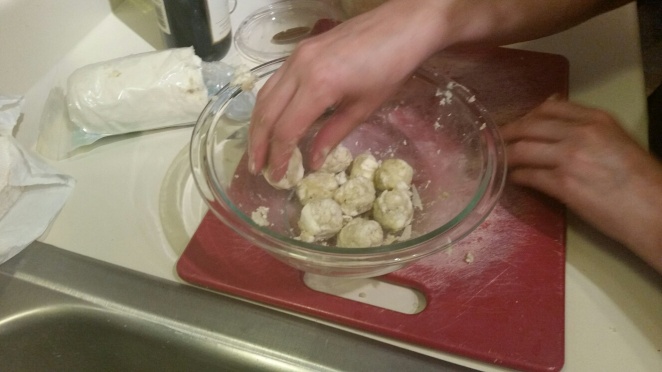
Add olive oil to a large, shallow pan and heat until the oil is shimmering.

Dip the cheese balls into the beaten egg, then into the flour and breadcrumb mixture, then add it to the hot oil in the pan. Yes, I’m a sloppy cook and I don’t care.
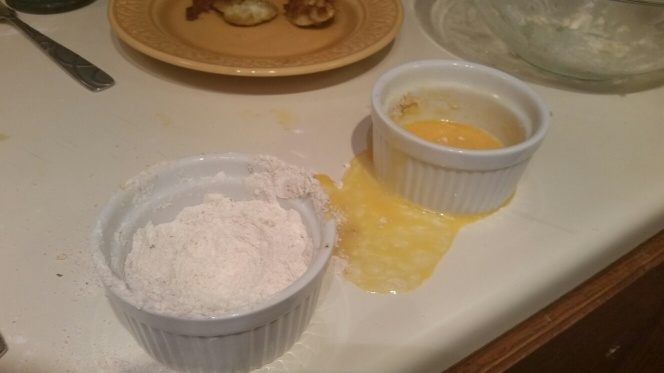
Add 3 or 4 flour-dusted cheese balls and fry until brown on one side, then flip and fry on the other side until browned. Don’t cook more than 4 minutes on either side, because the cheese will start melting out of the flour and egg.

Dab off the excess olive oil and nosh away. Nom nom nom!

“Stat rosa pristina nomine, nomina nuda tenemus.”

I’ve just posted a tribute post to your blog on mine based on the Montalbano novels by Andrea Camilleri. I hope you like it! http://chestnutsandtruffles.com/2016/03/08/pasta-ncasciata-montalbanos-favourite/
LikeLiked by 1 person
I am honored and touched beyond belief. I actually got a little emotional when I read this. I admire your cooking and writing so very much, and to have you do a tribute post to me is just amazing! Thank you so much! You’re wonderful.
LikeLiked by 1 person
Umberto Eco was one of the greatest writers of the 20th Century, Italian or otherwise, but also one of the people I’m most proud to call a compatriot. I am honoured my recipe helped you with this post, which I love. And this version sounds yummy. I am sure that Adso and William de Baskerville thought to too.
LikeLike
Luca, as a huge admirer of both your cooking and your blog, I can’t tell you how much your compliment means. Thank you so much!
LikeLiked by 1 person
Thank you so much. Being an avid reader as well as eater, I love your blog too!
LikeLike